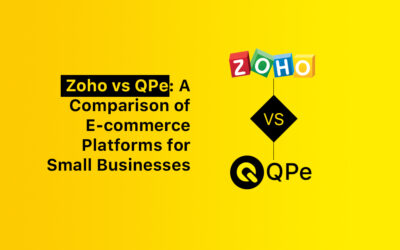The growth of e-commerce is happening worldwide not limited to one corner of the globe. Approximately 27 million e-commerce sites are functioning globally.
To run a business at scale, an effective e-commerce business plan is essential.
Yes, a business plan is crucial and so is a seamless buying experience for your customers! Qpe makes it happen for you. You get an all-in-one e-commerce platform to source, manage, and sell products all over the globe.
Let’s get back to the main topic of discussion – So how do you make a business plan for your e-commerce store?
TL;DR – How to Create a Commerce Business Plan
Don’t want to read the whole blog? We made it easier for you, here are the steps you need to follow to make your first e-commerce business plan from scratch:
- Define Your Business Vision and Goals
- Analyze The Market and Your Target Audience
- Outline the Products Or Services You Will Offer
- Set Pricing And Profitability Strategies
If this is not enough to get started, go ahead and read the whole blog where we discuss the whole process in detail.
What is an E-Commerce Business Plan?
An e-commerce business plan outlines long-term and short-term goals, strategies, operations, finances, risks, and other operational details. It allows you to validate your business idea, measure your financial position, and frame a concrete action plan.
Moreover, it is a document that promotes your purposes and motives, analyzes your industry and competitors, and identifies the resources required for the successful execution of the design. In addition, it enhances your decision-making skills by putting every detail on a paper.
Retail Business Plan vs. E-Commerce Business Plan
A retail and an e-commerce business plan are different from each other and so are their challenges. Listed below are some ways in which both business plans differ from each other:
Focal Point
A retail plan centers on the physical shopfronts such as stores, warehouses, offices, or factories, while an e-commerce business plan emphasizes designing the company’s digital storefront through websites, social media, and other online platforms.
Workforce
A retail business plan might include an organizational chart with many front-of-house staff members. In contrast, an e-commerce business plan would emphasize roles in online customer service for its management.
Reaching customers
E-commerce stores can get buried in search engine results pages (SERPs). So they need to find other ways to get noticed. Brick-and-mortar stores benefit from free advertising from foot and vehicle traffic.
Benefits Of An E-Commerce Business Plan
Imagine you have a House party next week, but still have no clue how to go about it because the plan is missing. The worst part? Your venue choices are no longer available due to the peak season!
Planning for your business isn’t much different. Let’s look at some of its potential benefits:
Helps Identify Potential Risks
Risk is a part of doing business. Focus on minimizing risks to ensure your business can safely run and grow. A business plan can help a business foresee possible risks by viewing the market situation. It outlines the best and worst-case scenarios that validate your idea’s worth. It will inform you of what’s happening in the marketplace and allow you to make better decisions.
Measures Progress
A well-crafted business plan helps to measure the progress and understand the roadblocks involved in your business.
In addition, it sets specific targets to help the business stay on track and keep the employees motivated.
Secure financing
Any business, along with a great strategy, business idea, brand name, advertisement, and manpower, also needs funding for its active functioning. The role of a convincing business plan comes here. Make sure it is realistic and compact as the investors and lenders may want to know how profitable a business is expected to be.
Make Critical and Informed Decisions
It is important to make recorded and clear decisions and communicate them effectively. To achieve this goal, gathering detailed sales and customer behavior reports is essential. It would help the business to make informed decisions.
This strengthens your case when marketing and selling to your target audience. Giving deep thought to the core strategies can help clarify how those selections will impact your broader strategy. A clear picture of your views will help to meet the business target.
Set Benchmarks
Along with innovation, analyzing the prevailing competition also plays a significant role in establishing a successful business. Benchmarking refers to comparing a company’s metrics to other businesses to analyze their plus points. Adopting those tactics can lead to various benefits, leading to improved efficiency and increased sales.
Moreover, setting smaller benchmarks provides short-term goals that would indeed take you to the path of great success.
How to Make an E-Commerce Business Plan
We already know how crucial it is to make a business plan. So, let’s see how you can make it happen!
Define Your Business Vision and Goals
Painting a clear picture of your ideal buyers is crucial for demonstrating that potential. The consumers and investors want to know – what is the future you’re building towards—not only now, but ten or twenty years down the line?
To create a business plan, clarity of thought is of utmost importance. A well-defined target for taking the business to greater heights by offering the best quality brands proves to be a success.
Certainly, planning out the journey of transforming the vision into a successful business is perhaps the most important step between concept and reality.
Here, proper planning serves as the roadmap, offering a brief and clear overview of your business It includes key elements like multi-store management and real-time inventory to handle the complex product catalogs.
Analyze The Market and Your Target Audience
To convert customers through organic marketing, you need to identify the right market.
Unfortunately, if you fail to understand the desires, core values, and preferences of your target audience, it can backfire tremendously.
Outline the Products Or Services You Will Offer
What products and services will you provide? How are your products and services different and better than other competitors? Why should they choose your offerings when there are endless options in the market? The answers to all these questions should be highlighted in your business plan.
Furthermore, our products and services are the foundation of your e-shop. So, the quality should never be compromised. Keep your focus on delivering value and effectively meeting the requirements of the customers.
Your offerings could be eccentric, tailored services, or a combination of both. Ensure your services align with your business plan’s vision. All these points when kept in mind, make your businesses ready to grow substantially.
Set Pricing And Profitability Strategies
With numerous online stores, come countless purchase options. It’s no longer the case that customers can only hunt their local stores and are bound to purchase from there.
Now, buyers can go online, compare, and find the prime value for their money. This pushes online marketers to compete on price — with innovative ideas.
Consequently, an e-commerce pricing strategy is one of the key factors for favorable outcomes. Cost efficiency along with durability should be checked for better responses.
Price dictates the brand position in the hawk, including its marketing scheme, brand perception, and market share. So, what can you do to achieve it? Opt for competitive pricing plans that offer significant savings without compromising on essential business features.
Here, compatibility with CRM systems, payment gateways, and other third-party tools play a magnificent role in streamlining operations.
Steps to Develop an E-Commerce Strategy Plan
To clarify your goal and the way to reach there, a foolproof business plan plays a chief role. It would undoubtedly take a lot of time and energy but would make your work easier in the long run. So let’s dive in and witness how to design a detailed plan for success. But make sure, you follow it.
Perform Competitor Analysis
Competitor analysis is a multi-facet process, which focuses on finding the main movers and shakers in the market. You need to recognize your top competitors and dive deep into their strengths, shortcomings, best-selling products, and pricing strategies.
Secondly, you are required to gather information about your competitors’ course of action, through their website/online store, media platform, and other sources.
One thing to keep in mind – Nearly all products you can think of are already being sold by someone else. That adds both positive and negative aspects to your venture. So, you need to work towards becoming the best seller in the market because the demand could lead to profits and extension.
Choose The Right Platform and Tools
Setting up a web business is not just putting a product list on the internet. It’s way more elaborate and complex. Just like owning a physical shop, well-thought-out planning goes into building an e-commerce set-up.
If you get this principle right, you can take advantage of the digital world by utilizing Integrated SEO tools, retargeting options, loyalty programs, and email marketing for growing sales.
The best platform to do it? QPe! It offers you the most powerful e-commerce tools to source, sell, and market your products effortlessly. You pay a flat monthly fee with no hidden or extra costs for utilizing the magic of the platform.
Develop a Marketing Plan for Brand Visibility
An e-commerce marketing plan comprises an outright way to regulate sales and encourage enterprise expansion. To attain this, various tools to enhance website visitors, drive conversions, and increase sales for your business are essential.
An e-commerce marketing plan is designed to conduct campaigns addressing clients across the range of sales grids.
In addition, multi-currency and multi-language support for businesses is needed to reach international markets. A business plan would keep you notified and help and help touch greater heights.
Plan Logistics and Supply Chain Management
Supply chains are important as they guide companies on how to do cost reduction through trustworthy suppliers who provide sustainable products at dynamic costs.
They also ensure the efficient supply of products without any delays or extra shipping charges for long distances (which could result in lost sales).
E-commerce helps in supply chain management by providing a medium for online orders and payments, as well as tracing shipments and listing. It also improves the product delivery speed and allows customers to track their orders.
Summing Up
In a nutshell, creating a comprehensive business plan should be one of your priorities if you’re moving towards starting an e-commerce business. Its ploy allows stakeholders to have a shared understanding of the ultimate goal and the journey to reach the final destination. The ability to sell seamlessly across diverse platforms, including websites, social media, and physical stores becomes organized through a business plan.
Moreover, you should opt for tools that help automate customer communication and loyalty programs. The motive should be to target multiple currencies, languages, and regional tax management to expand globally.
A business plan helps you lay out your goals and strategies, and determine how much money you’ll need to get started. A solid business plan can help your online business survive its first years and thrive beyond them.
Remember, your business plan is a living tool that will change according to the development of your company.
Frequently Asked Questions (FAQs):
What Are The Key Elements Of An Online Store Business Plan?
The key elements of a business plan are as follows-
- Products and services
Your products or services segment should include every detail of your product for eg., its pricing, product lifespan, production, and manufacturing processes.
- Executive summary
This section contains a concise overview of the business concept, mission, vision, market potential, products and services offered, and financial projections.
- Market research
Conducting market research can help you reduce risk, understand your competitors, identify market trends, and hence enhance customer experience.
- Marketing blueprint
A well-defined marketing strategy should be drafted and followed for the systematic functioning of the online store.
- Financial plans and projections
A balance sheet, income statement, and cash-flow statement should be maintained to meet the financial targets.
What Mistakes Should I Avoid In My Shopify Business Plan?
- Inadequate market research
Do proper market research focussing on the right audience and be unaware of the competition could stop you from succeeding.
- Including excessive information
If you include more information than required, then you will end up missing the important points while executing it. So, it’s necessary to pen down only the data required for the proper execution.
- Being inconsistent
Make sure that the facts you have highlighted about the target markets, statistics, and strategies are well-prepared and knowledgeable. It would add to your advantage to reach your goal.
- Not knowing the target audience
If you fail to discover the target audience, you won’t be able to meet the customer requirements. Knowing your buyers will make you stand out in a cut-throat market.
- Underestimating the competitors
You should know your competitors, and evaluate what your competitors are doing to attract customers. Accordingly, frames an accurate picture of what the industry demands now and in the future.
- Unrealistic financial projections
One of the most common business plan mistakes is overestimating the value of your company. Doing this would lead to unrealistic financial projections.



